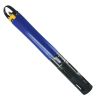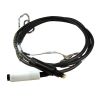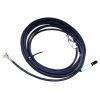YSI Cable Grip Kit
Features
- Sustained loading of 40 lbs.
- Corrosion-resistant 316 SS and Xenoy plastic construction
- 2-year warranty
- Expedited repair and warranty service
- Lifetime technical support
- More
Overview
The YSI Cable Grip Kit is designed to add redundant protection to your Field Cable, Flying Lead Field Cable, or Vented Flying Lead Field Cable for EXO and ProSwap Logger systems. Proper installation allows the 316 Stainless Steel (SS) parts to add additional support, and offers the best corrosion resistance currently available for high-fouling monitoring applications. The cable grip can serve many functions.
EXO Cables
Primary purpose is to act as a backup sonde retention system by clamping near the sonde connector end of the cable. It may also be used to provide strain relief for the connector (optional). The EXO cable connector is robust and does NOT require strain relief, but some users may opt to utilize this feature.
ProSwap Logger Cables
Provides a point of suspension or mounting for the ProSwap Logger by clamping near the connector end of the cable. This may be necessary to secure the cable for standalone applications. If connecting to an external power supply or DCP, the cable grip may be used as an optional retention system.
Grip Options for Cables
- 599951-01: 0.344 diameter cable grip for use with non-vented cables
- EXO Cables: 599008-x and 599040-x
- ProSwap Logger: 610151-x, 610152-x, 6101514-x, and 610155-x
- 599951-02: 0.360 diameter cable grip for use with vented cables
- EXO Cables: 599210-x
- ProSwap Logger: 610150-x and 610153-x
- Sustained Loading: 40 lb / 18.14 kg
- Max Short Term Loading (abrupt shock): 200 lb / 90.72 kg
In The News
Spring 2025 Environmental Monitor Available Now
In the Spring 2025 edition of the Environmental Monitor, we highlight partnerships across the world and the importance of collaboration between government agencies, universities, environmental groups, local communities, and other stakeholders. From great white shark research in Cape Cod to monitoring fisheries in Lake Erie, this latest edition underscores partnerships that connect stakeholders in a watershed through environmental data. With an emphasis on data sharing, a combination of real-time and discrete sampling keeps the public and partners informed of environmental conditions. Our writers also sought out science professionals dedicated to working with peers within and outside of the environmental sector.
Read MoreMonitoring Mariculture in the Gulf of Alaska
The mariculture industry in the Gulf of Alaska has been steadily growing in recent years, guided by ongoing research to help refine farm location and cultivation practices. A subset of aquaculture, mariculture focuses on rearing organisms in the open ocean. In Alaska, finfish farming is illegal, so most farms cultivate kelp, oysters, or a combination of the two. These small, locally operated farms started popping up in the Gulf of Alaska in the early 1990s, when shellfish farming first became legal. Kelp farming did not begin to catch on in the state until 2016. Many of the coastal areas that have grown interested in mariculture are historically commercial fishing communities.
Read MoreSupplying Seattle’s Drinking Water: Using Data Buoys to Monitor the Cedar River Municipal Watershed
Providing clean, safe, and reliable drinking water for the 1.6 million people in the greater Seattle area is a top priority for Seattle Public Utilities (SPU). With limited water supplies, SPU dedicates considerable resources to maintain its watersheds and mountain reservoirs. About 70 percent of Seattle Water comes from the Cedar River Municipal Watershed , and the other 30 percent comes from the South Fork Tolt River Watershed . [caption id="attachment_39574" align="alignnone" width="940"] Data buoy in Chester Morse Lake . (Credit: Kevin Johnson / Seattle Public Utilities) [/caption] Jamie Thompson, a fisheries biologist at SPU, monitors aquatic ecosystems centered on fish listed under the U.S. Endangered Species Act (ESA).
Read More




























